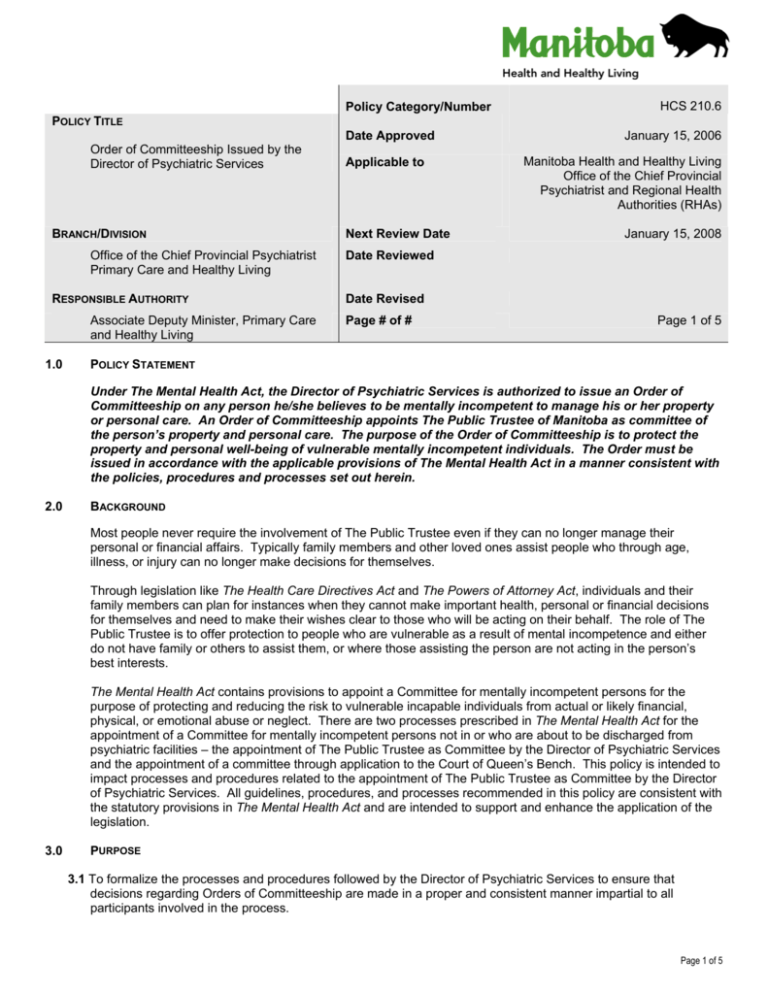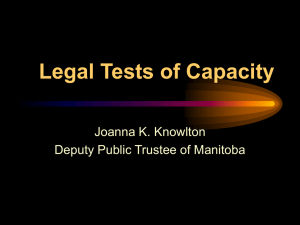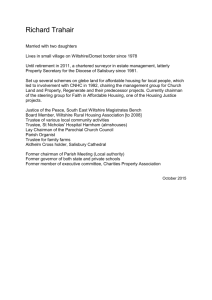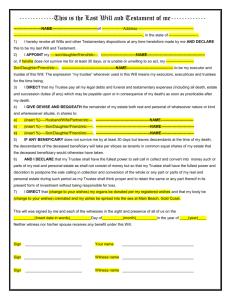Policy
advertisement

Policy Category/Number HCS 210.6 POLICY TITLE Date Approved Order of Committeeship Issued by the Director of Psychiatric Services BRANCH/DIVISION Office of the Chief Provincial Psychiatrist Primary Care and Healthy Living RESPONSIBLE AUTHORITY Associate Deputy Minister, Primary Care and Healthy Living 1.0 Applicable to Next Review Date January 15, 2006 Manitoba Health and Healthy Living Office of the Chief Provincial Psychiatrist and Regional Health Authorities (RHAs) January 15, 2008 Date Reviewed Date Revised Page # of # Page 1 of 5 POLICY STATEMENT Under The Mental Health Act, the Director of Psychiatric Services is authorized to issue an Order of Committeeship on any person he/she believes to be mentally incompetent to manage his or her property or personal care. An Order of Committeeship appoints The Public Trustee of Manitoba as committee of the person’s property and personal care. The purpose of the Order of Committeeship is to protect the property and personal well-being of vulnerable mentally incompetent individuals. The Order must be issued in accordance with the applicable provisions of The Mental Health Act in a manner consistent with the policies, procedures and processes set out herein. 2.0 BACKGROUND Most people never require the involvement of The Public Trustee even if they can no longer manage their personal or financial affairs. Typically family members and other loved ones assist people who through age, illness, or injury can no longer make decisions for themselves. Through legislation like The Health Care Directives Act and The Powers of Attorney Act, individuals and their family members can plan for instances when they cannot make important health, personal or financial decisions for themselves and need to make their wishes clear to those who will be acting on their behalf. The role of The Public Trustee is to offer protection to people who are vulnerable as a result of mental incompetence and either do not have family or others to assist them, or where those assisting the person are not acting in the person’s best interests. The Mental Health Act contains provisions to appoint a Committee for mentally incompetent persons for the purpose of protecting and reducing the risk to vulnerable incapable individuals from actual or likely financial, physical, or emotional abuse or neglect. There are two processes prescribed in The Mental Health Act for the appointment of a Committee for mentally incompetent persons not in or who are about to be discharged from psychiatric facilities – the appointment of The Public Trustee as Committee by the Director of Psychiatric Services and the appointment of a committee through application to the Court of Queen’s Bench. This policy is intended to impact processes and procedures related to the appointment of The Public Trustee as Committee by the Director of Psychiatric Services. All guidelines, procedures, and processes recommended in this policy are consistent with the statutory provisions in The Mental Health Act and are intended to support and enhance the application of the legislation. 3.0 PURPOSE 3.1 To formalize the processes and procedures followed by the Director of Psychiatric Services to ensure that decisions regarding Orders of Committeeship are made in a proper and consistent manner impartial to all participants involved in the process. Page 1 of 5 3.2 To ensure that affected individuals (or their representatives) have the opportunity to participate in the decision making process carried out by the Director of Psychiatric Services and have an opportunity to impact the outcome of those decisions. 3.3 To ensure that the processes and procedures followed by the Director of Psychiatric Services result in meaningful participation by individuals (or their representatives) who oppose an Order appointing The Public Trustee as committee. 4.0 DEFINITIONS 4.1 Director of Psychiatric Services The Office of the Chief Provincial Psychiatrist/Director of Psychiatric Services is responsible for numerous legislated and non-legislated functions. The position is held by one suitably qualified individual, in whose absence a delegate is appointed. The legislated functions of the Director of Psychiatric Services include: • Administering The Mental Health Act; • Administering the Orders of Committeeship Program, including issuing/cancelling Orders of Committeeship; • Issuing Authorizations of Transfer approving transfers of patients between psychiatric facilities; and, • Promoting proper interpretation and application of The Mental Health Act. As Chief Provincial Psychiatrist, the non legislated functions include: • Providing professional consultation to various sectors of the health care system; • Administering and coordinating the Career Program in Psychiatry; • Promoting recruitment and retention of psychiatrists for under-serviced areas in Manitoba; • Maintaining working linkages with relevant professional and licensing bodies; and participating on relevant committees, working groups and boards. 4.2 The Public Trustee The Public Trustee is a trustee of last resort and becomes involved in administering clients' personal and financial affairs or estates only when required to do so. The Public Trustee becomes involved in these matters in the following ways: • As Committee of a person not mentally capable of making his or her own financial or personal decisions by being appointed as Committee by the Director of Psychiatric Services or by the Court of Queen's Bench under The Mental Health Act. • As Substitute Decision Maker of a vulnerable person living with a mental disability, by being appointed a Substitute Decision Maker of a vulnerable person by the Vulnerable Persons Commissioner under The Vulnerable Persons Living With a Mental Disability Act. • As Attorney, by being granted a Power of Attorney by a mentally competent person who requires assistance administering his or her estate. • As Estate Administrator by Court of Queen's Bench appointment. • As trustee of infant trust funds, by the Court of Queen's Bench or under a variety of provincial statutes. 4.3 Mental Incompetence Mental incompetence is a legal rather than a medical term. Few statutes and jurisdictions embrace the concept of global incompetency but instead focus on narrow tasks, and specific competencies. Thus, the ability to make a will (testamentary capacity), the ability to give consent, the ability to stand trial (fitness), the ability to manage one's finances (financial competency) and the ability to care for oneself (personal competency), are emerging in law and thus in clinical practice as separate entities1. 1 MacKay, M.J. (1989). Financial and Personal Competency in the Elderly. Paper submitted to the Professional Standards Council of the Canadian Psychiatric Association. Page 2 of 5 Under the definitions in The Mental Health Act the meaning of incapacity for personal care is described as follows: Meaning of incapacity for personal care 3 For the purpose of Parts 8 and 9, a person is incapable of personal care if he or she is repeatedly or continuously unable, because of mental incapacity, (a) to care for himself or herself; and (b) to make reasonable decisions about matters relating to his or her person or appreciate the reasonably foreseeable consequences of a decision or lack of decision. The Mental Health Act provides criteria that physicians must consider when assessing mental competency: Considerations 60(2) In forming an opinion under subsection (1), the physician shall consider all the relevant circumstances, including the following: (a) the nature and severity of the person's mental condition; (b) the effect of the person's mental condition on his or her ability to manage property and capacity for personal care; (c) the nature of the person's property and personal care requirements and any arrangements known to the physician that the person made, while competent, for the management of property and the appointment of a proxy; and (d) whether or not decisions need to be made on the person's behalf about that property or with respect to personal care. 4.4 Court-Appointed Committee Any person resident in Manitoba may apply to the Court for an Order to appoint a committee of the property of a person or a committee of both the property and personal care of a person. An application to the Court to appoint a committee requires an affidavit by the applicant, the proposed committee or another knowledgeable person setting out in detail the reasons for the application; the signed consent of the person alleged to be incapable if competent to consent; the signed consent of the proposed committee and of the allegedly incapable person’s spouse, children, parents and siblings; and the affidavits by at least two physicians describing the mental condition of the person alleged to be incapable. 5.0 POLICIES AND PROCEDURES 5.1 Comprehensive Information Must be Gathered to Determine Incompetence and the Need for an Order • • • • The minimum statutory requirement for the Director to make a determination of incompetence and the need for an Order is a Certificate of Incapacity submitted by a physician as soon as reasonably possible but not later than 30 days after personally examining the person, and stating the physician’s reasons for the opinion that the person is incompetent. The Director must be satisfied that the Certificate of Incapacity is properly completed. Where available, additional information beyond the minimum statutory requirement of the duly completed Certificate of Incapacity must be requested by the Director. This must include any relevant information about the person including whenever possible a social history or background information completed by a social worker, a community mental health worker or other healthcare professional, corroborating the person’s incompetence and the need for an Order. Page 3 of 5 • • • In addition to ensuring adequate information is available for determining incompetence, where necessary inquiries must also be made of the physician, social worker, or others involved, regarding family members, their whereabouts, and their connection to the individual. The Director may interview relatives of the person as to the history and circumstances of the person and may consult with any medical and other experts considered advisable concerning the person for whom a committee may be appointed. All relevant information must be carefully reviewed by the Director to enable a proper and informed decision regarding the person’s competence and giving a Notice of Intent to issue an Order. 5.2 Proper Notifications Respecting the Notice of Intent and the Order Must be Made • • • • • If the Director is satisfied from the information submitted that a committee should be appointed, the Director must send a Notice of Intent by certified mail to the person named in the Certificate, his or her proxy named in a Health Care Directive and the person’s nearest relative, informing them that the Director intends to issue an Order appointing The Public Trustee as committee of both the property and personal care of the person; and that they may make a written objection within seven days after receiving the Notice of Intent. The Director must also provide an outline of the legal provisions regarding giving the Notice of Intent and issuing the Order, to the person, his or her proxy and nearest relative. The Director must consider any objections and review any additional information received prior to deciding whether to issue the Order of Committeeship. If the Director is satisfied that it would be in the best interests of the person, he will then issue an Order of Committeeship. The Director must send the Order and a copy of the Certificate to The Public Trustee, and a copy of the Order and of the Certificate by certified mail to the person, the person’s proxy and nearest relative. The Director must inform the person, the person’s proxy and nearest relative that: Those so notified, or any other person with leave of the court, may apply to the court for an order cancelling the Order of Committeeship, or appointing a person other than The Public Trustee as the committee. Those so notified may request a physician to examine the person and if the person is determined to be no longer incapable, application may be made to the Director to cancel the Order of Committeeship. If the person has given a pre-existing valid Enduring Power of Attorney, The Public Trustee must investigate to determine what is in the person’s best interests and if The Public Trustee decides to no longer act as committee, the Order is cancelled by the Director on receiving notice from The Public Trustee and the attorney may resume acting under the Power of Attorney. If a committee is duly appointed for the incapable person in another jurisdiction, the Order is cancelled by the Director on the recommendation of The Public Trustee. 5.3 Share the Information On Which the Notice of Intent/Order is Based • • • • • • The Director should ensure meaningful participation by those involved through sharing with the person affected by the Order (or their representative) the information on which the Order is based in accordance with applicable legislation and the following procedures. Appropriate reference to the available information (e.g. Certificate of Incapacity, healthcare provider report) must be included in the Notice of Intent which informs the person named in the Certificate, his or her proxy and nearest relative, of the Director’s intent to issue an Order of Committeeship. The Notice of Intent must include a statement which informs the individual or their representative that they may request access to the information on which the Order is based under The Personal Health Information Act. This information must be requested in writing by the individual or their representative. The Director must make available a Manitoba Health Request For Access To Personal Health Information Form to facilitate a request for access to the information on which the Order is based consistent with the privacy legislation. This Form would be made available to the affected person or their representative upon request. In some instances it may not be in the person’s best interests to share the information on which the Order is based. Only in exceptional circumstances would information not be shared. Reasons for not sharing certain information should be documented in the person’s file. Page 4 of 5 5.4 Provide for a Personal Interview with the Director to Discuss Objections to the Order • • • • • • Persons who object to the Order must be provided the option of an interview with the Director to discuss their written objections prior to the Director making a decision about the appointment of The Public Trustee as committee. Where the person objecting is the subject of the Order, the Director must provide information about the process and discuss their written objections but will not assess/reassess the person’s competence. Although there is a seven day period within which objections must be made in writing, once they are made there is no time limit prescribed in the legislation on assessing the situation further. The time available depends on the particular circumstances of the individual case. Individuals or family members may be invited to include a representative in the interview to assist them in expressing their views. The Director may ask other knowledgeable persons to review the information presented and provide advice, however the final decision must be the Director’s. The Director may offer to meet with the individual or family once the Order is made to explain the reasons for the Order and the mechanisms for appeal. In some instances, if appropriate, this meeting may take place jointly with The Public Trustee. 5.5 Emergency Orders Must Meet Statutory Requirements • • • • • • 6.0 If the Director believes on reasonable grounds, usually based upon the request of the applicants for the Order, that the person requires a committee on an urgent basis, he may make an emergency Order of Committeeship. An emergency Order of Committeeship is only issued as a last resort to protect the individual as soon as possible and only if the specific requirements of The Mental Health Act are met, i.e. if there is immediate danger of death or serious harm or deterioration to the physical or mental health of the person, or of serious loss to his or her property; and the person needs decisions to be made on his or her behalf to prevent that danger. All the same initial criteria that must be met for a non-urgent Order must also be met for an emergency Order such as the receipt of a Certificate of Incapacity completed by a physician who must personally examine the individual, a social history, and any other relevant information necessary to enable a proper and informed decision. There are limited options for participation by those affected prior to issuing an emergency Order due to the circumstances under which it is required. However, once the emergency Order is issued, the same provisions for cancelling a non-urgent Order are available for one made on an urgent basis. The Director must send the Order and a copy of the Certificate to The Public Trustee, and a copy of the Order and of the Certificate by certified mail to the person, the person’s proxy and nearest relative. The Director must inform the person, the person’s proxy and nearest relative that they, or any other person with leave of the court, may apply to the court for an order cancelling the Order of Committeeship, or appointing a person other than The Public Trustee as the committee; they may request a physician to examine the person and if the person is determined to be no longer incapable, application may be made to the Director to cancel the Order of Committeeship; and if the person has given a pre-existing valid Enduring Power of Attorney, The Public Trustee must investigate to determine what is in the person’s best interests and if The Public Trustee decides to no longer act as committee, the Order is cancelled by the Director and the attorney may resume acting under the Power of Attorney. CORE SUPPORTING DOCUMENTS: Standards, Procedures, Guidelines The Mental Health Act The Health Care Directives Act The Powers of Attorney Act The Vulnerable Persons Living with a Mental Disability Act The Personal Health Information Act Page 5 of 5







